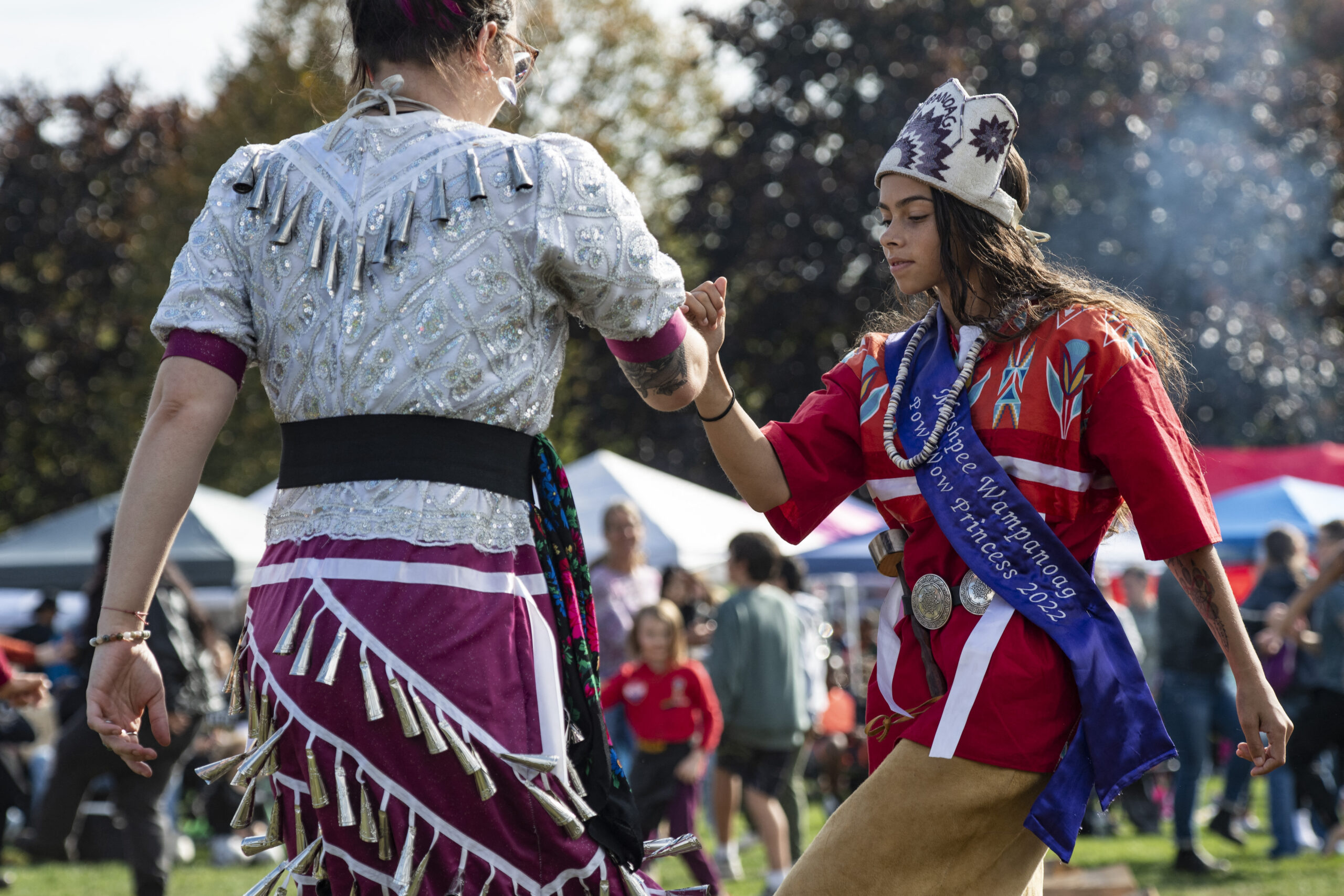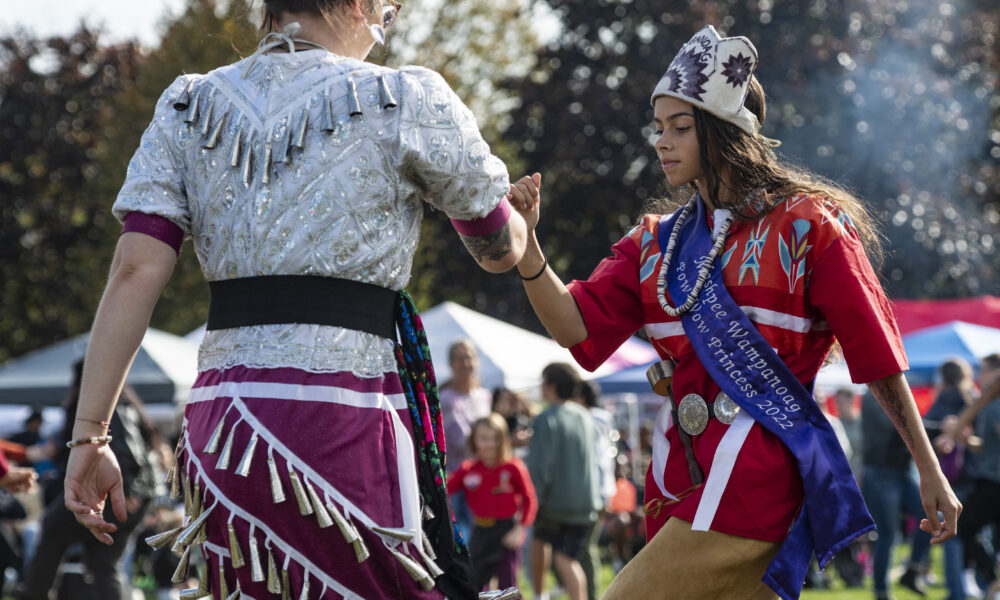International
Native Americans fear loss of Indigenous languages in US

AFP | Nicolas Revise with Joe Prezioso in Newton, Massachusetts
As Native Americans this week celebrated Indigenous Peoples Day — the holiday increasingly recognized in the United States in lieu of “Columbus Day” — members of the continent’s hundreds of tribes shared a common concern: the ongoing extinction of their ancestral languages.
The United States is currently home to 6.8 million Native Americans, or two percent of the population.
Members of the Shinnecock Nation on Long Island gathered for the sunrise to honor this week’s holiday, which has been adopted by more than a dozen US states and cities amid the growing view that Italian explorer Christopher Columbus brought little more than genocide and colonization to the Americas in 1492.
And further north on the Atlantic Coast, people of the Americas and Caribbean ate together as they held discussions, danced and sang.
But while their ancestors saw their communities decimated by centuries of colonization, descendants today fear their culture and languages could be swallowed up in a single generation by English and Spanish.
Decrying “the invasion of the 21st century,” Anthony Sean Stanton, the 64-year-old head of the Narragansett tribe, said his people must “hang onto what we got because once it’s gone, it’s gone forever.”
Further west, the Lakota — a prominent subculture of the Sioux, located primarily in North and South Dakota — also fear the extinction of their language, currently spoken by 1,500 people, compared to 5,000 speakers two decades ago.
For many communities, including the Lakota, the generational transmission of languages halted around the mid-1980s, said linguist and activist Wilhelm Meya, who serves as president of The Language Conservancy (TLC) in Indiana.
There is “a very small window of opportunity to try to bring the language back before the last speakers of this language pass on. And this is a story that’s replicated across hundreds of communities in North America,” he said.
“We’re in the forefront of trying to prevent this total collapse of Indigenous languages in North America.”
‘Hungry’ for language
According to TLC, some 2,900 languages of the approximately 7,000 spoken worldwide are endangered.
At this rate, the organization says, nearly 90 percent of all languages could become extinct in the next 100 years.
Native American languages are dying out at an even faster rate, according to the non-profit, with more than 200 already eradicated.
The best preservation strategy is to teach these languages in schools, says Meya, who notes that the federal government finally allowed communities to take up the practice in the early 1970s.
He also urges the development of other materials in the ancestral languages, including translating cartoon series and documentary films, as well as creating dictionaries and assisting with teacher trainings.
“Anything we can do to reach the young people who are very, very hungry for their language,” Meya said. “They want their culture, they want their identity.”
‘Part of who I am’
Miya Peters, an 18-year-old member of the Wampanoag tribe along the northeastern US coast, is one such example. She learns her language as part of a partnership between her tribal school and public school.
“I love it. It is hard. It’s very different,” she said. “But it’s part of who I am. So it always just gives me that encouragement to just keep going and bring it back.”
Meya and his colleague Travis Condon aim to continue the work of Kevin Locke, an ardent defender of his Lakota language and culture.
The 68-year-old flautist, hoop dancer and storyteller died suddenly on September 30.
“He was definitely a warrior for his tribe, you know, an ambassador for mankind,” Meya said.
The linguist emphasized the need for federal investment in language preservation.
“It took the federal government 100 years and billions of dollars to eradicate Native American languages through the boarding school system,” he said. “And it’s gonna take equal amount of resources to bring back Indigenous languages in North America.”
“It’s much, much more difficult to create than it is to destroy.”
International
U.S. Senate Rejects Budget, Bringing Government Closer to Shutdown Amid DHS Dispute

The U.S. Senate voted on Thursday against a budget proposal in a move aimed at pressuring changes at the Department of Homeland Security (DHS), following the killing of two civilians during a deployment of immigration agents in Minneapolis.
All Senate Democrats and seven Republican lawmakers voted against the bill, which requires 60 votes to advance, pushing the country closer to a partial government shutdown that would cut funding for several agencies, including the Pentagon and the Department of Health.
The rejection came as Senate leaders and the White House continue negotiations on a separate funding package for DHS that would allow reforms to the agency. Proposed measures include banning Immigration and Customs Enforcement (ICE) agents from wearing face coverings and requiring them to use body-worn cameras during operations.
The vote took place just hours after President Donald Trump said he was “close” to reaching an agreement with Democrats and did not believe the federal government would face another shutdown, following last year’s record stoppage.
“I don’t think the Democrats want a shutdown either, so we’ll work in a bipartisan way to avoid it. Hopefully, there will be no government shutdown. We’re working on that right now,” Trump said during a Cabinet meeting at the White House.
International
Trump Says Putin Agreed to One-Week Halt in Attacks on Ukraine Amid Extreme Cold

U.S. President Donald Trump said on Thursday that he secured a commitment from Russian President Vladimir Putinto halt attacks against Ukraine for one week, citing extreme weather conditions affecting the region.
“Because of the extreme cold (…) I personally asked Putin not to attack Kyiv or other cities and towns for a week. And he agreed. He was very pleasant,” Trump said during a Cabinet meeting broadcast by the White House.
Trump acknowledged that several advisers had questioned the decision to make the call.
“A lot of people told me not to waste the call because they wouldn’t agree. And he accepted. And we’re very happy they did, because they don’t need missiles hitting their towns and cities,” the president said.
According to Trump, Ukrainian authorities reacted with surprise to the announcement but welcomed the possibility of a temporary ceasefire.
“It’s extraordinarily cold, record cold (…) They say they’ve never experienced cold like this,” he added.
Ukrainian President Volodymyr Zelensky later commented on the announcement, expressing hope that the agreement would be honored.
International
Storm Kristin Kills Five in Portugal, Leaves Nearly 500,000 Without Power

Storm Kristin, which battered Portugal with heavy rain and strong winds early Wednesday, has left at least five people dead, while nearly half a million residents remained without electricity as of Thursday, according to updated figures from authorities.
The revised death toll was confirmed to AFP by a spokesperson for the National Emergency and Civil Protection Authority (ANPEC). On Wednesday, the agency had reported four fatalities.
Meanwhile, E-Redes, the country’s electricity distribution network operator, said that around 450,000 customers were still without power, particularly in central Portugal.
Emergency services responded to approximately 1,500 incidents between midnight and 8:00 a.m. local time on Wednesday, as the storm caused widespread disruptions.
The Portuguese government described Kristin as an “extreme weather event” that inflicted significant damage across several regions of the country. At the height of the storm, as many as 850,000 households and institutions lost electricity during the early hours of Wednesday.
Several municipalities ordered the closure of schools, many of which remained shut on Thursday due to ongoing adverse conditions.
Ricardo Costa, regional deputy commander of the Leiria Fire Brigade, said residents continue to seek assistance as rainfall persists.
“Even though the rain is not extremely intense, it is causing extensive damage to homes,” he noted.
In Figueira da Foz, a coastal city in central Portugal, strong winds toppled a giant Ferris wheel, underscoring the severity of the storm.
-

 Central America3 days ago
Central America3 days agoGuatemala seizes over a ton of cocaine hidden in flour at Pacific port
-

 International4 days ago
International4 days agoDelcy Rodríguez seeks political agreements after Maduro’s ouster
-

 International3 days ago
International3 days agoHistoric snowstorm paralyzes Toronto after 60 centimeters of snow
-

 International3 days ago
International3 days agoSpain’s irregular migrant population rises to 840,000, study finds
-

 Central America2 days ago
Central America2 days agoGuatemala Police Arrest Prison Guard Caught in the Act of Extortion
-

 Central America2 days ago
Central America2 days agoHonduras swears in conservative president Asfura after disputed election
-

 International4 days ago
International4 days agoFederal immigration agents kill man in Minneapolis, sparking protests and outrage
-

 International1 day ago
International1 day agoFootball Fan Killed in Clashes After Colombian League Match
-

 Central America2 days ago
Central America2 days agoBukele leads public trust rankings as UCA survey highlights gains in security
-

 International2 days ago
International2 days agoWinter Storm Fern Leaves 30 Dead and Over One Million Without Power Across the U.S.
-

 International2 days ago
International2 days agoDoomsday clock moves to 85 seconds before midnight amid rising global risks
-

 Sin categoría2 days ago
Sin categoría2 days agoEight Killed in Series of Armed Attacks in Ecuador’s Manabí Province
-

 International3 days ago
International3 days agoRights group says nearly 6,000 killed in Iran protest crackdown
-

 International1 day ago
International1 day agoMissing Spanish Sailor Rescued After 11 Days Adrift in Mediterranean
-

 International1 day ago
International1 day agoRubio Says U.S. Could Participate in Follow-Up Russia-Ukraine Talks
-

 Central America1 day ago
Central America1 day agoGuatemala President Says Starlink Terminal Found Inside Prison
-

 International2 days ago
International2 days agoSpain approves plan to regularize up to 500,000 migrants in Historic Shift
-

 Sin categoría2 days ago
Sin categoría2 days agoEl Salvador Launches Fourth Year of Ocean Mission to Protect Marine Ecosystems
-

 International3 days ago
International3 days agoVenezuela frees at least 80 political prisoners, NGO says
-

 International3 days ago
International3 days agoEU launches new probe into X over AI-generated fake nude images
-

 International3 days ago
International3 days agoSevere winter storm grips U.S., leaves multiple dead as extreme cold persists
-

 International3 days ago
International3 days agoFrance debates ban on social media for children under 15
-

 International3 hours ago
International3 hours agoU.S. Senate Rejects Budget, Bringing Government Closer to Shutdown Amid DHS Dispute
-

 International3 hours ago
International3 hours agoMan Arrested After Vehicle Crashes Into Jewish Institution in Brooklyn
-

 International3 hours ago
International3 hours agoStorm Kristin Kills Five in Portugal, Leaves Nearly 500,000 Without Power
-

 International3 hours ago
International3 hours agoTrump Says Putin Agreed to One-Week Halt in Attacks on Ukraine Amid Extreme Cold




























